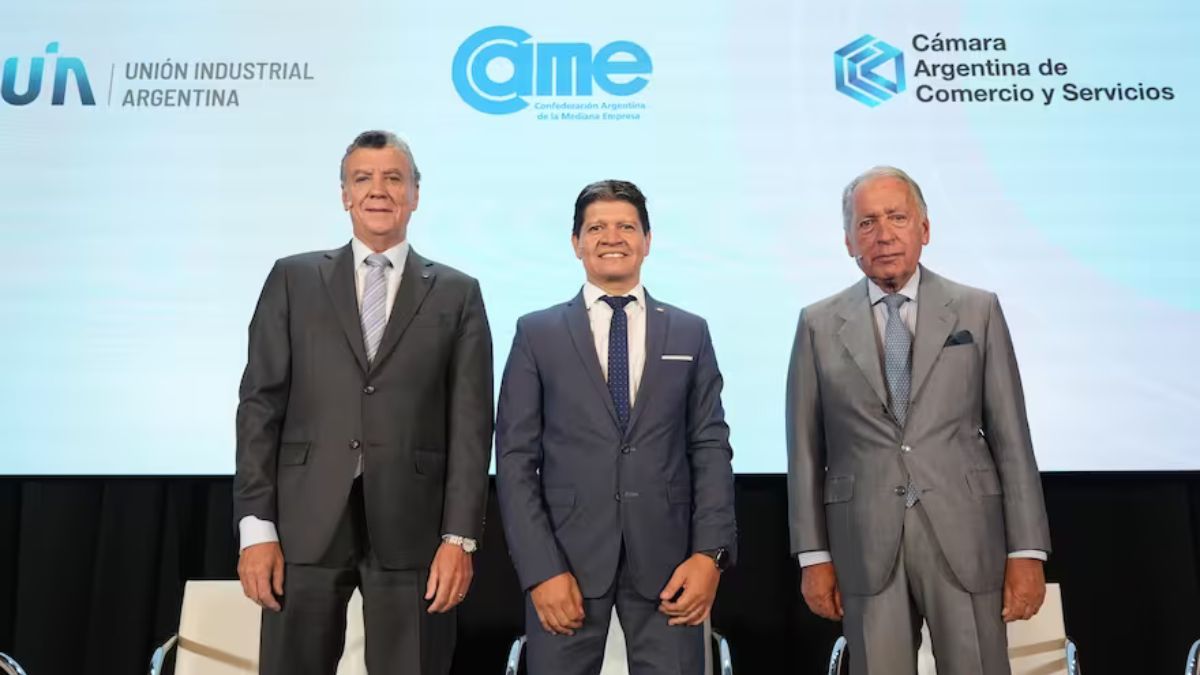The president of the Argentine Confederation of Medium Enterprises (CAME), Alfredo Gonzalezreferred to the different measures that were promoted through the omnibus law and that concern the SME sector. In this context, he highlighted in dialogue with Ambit that “In most regulations it remains to be seen how they will be applied.“, since several initiatives aim to “favor competition” either “encourage private investment“, but it is not yet clear how it will be applied.
In that sense, González highlighted that the SME sector is attentive to the “new rules that favor competition and defend SMEs from economic concentration“, since it is a sensitive issue for that economic area. Regarding the gray areas regarding the application of the rules, he exemplified: “In tourism, the ‘promotion of private investment’ is established, but it remains to be seen what instruments will encourage this investment”.
González also went back to the pandemic and recalled that SMEs have a “Tax moratorium suspended until April” to pay the debts that remained from that period of very low economic activity and that “if the interest rate Badlar remains high in April, we will have problems again.
As for the withholdings to regional economieshe president of CAME classified them as “a strong blow to SMEs in the provinces“. And he pointed out: “If this retention is added to the subsistence effort, which represents a reduction in income, those punished impact the ventures that have no other form of financing other than the capitalization of surpluses themselves.”
scenery. In February the slaughter of females represented 45% of the total. Producers warn that despite the increase in farm prices, they are still working with very tight margins.
Omnibus law: Cold stores highlighted health regulations
The representative chambers of the refrigeration industry They highlighted that the incorporation of meat chapter in the project of “omnibus law“sent to Congress”proclaims a reform requested for years by the sector“, while “guarantees the health of consumers“by establishing a National Health Status.
The statement, which refers to what is established in section I Meats, from Chapter VIII Bioeconomyin the project of “Law of Bases and Starting Points for the Freedom of Argentines“, is signed by the Argentine Meat Exporters Consortium (ABC)the Union of the Argentine Meat Industry (UNICA) and the Federation of Argentine Regional Refrigeration Industries (FIFRA).
“With great pleasure, from ABC, UNICA and FIFRAthe three most representative chambers of animal slaughter in Argentina, we see the incorporation of a meat chapter that advocates a reform requested for years by the sector“, indicated the chambers in a statement.
At the same time, they added that the project “gives guarantees for the health of Argentine consumers by establishing a National Health Status and designate a health authority at the federal level with the power to control the slaughter, processing and transportation of bovine products and by-products throughout the national territory.”
“Since Law 3,959 in 1900 we have been discussing the powers and few took care to exercise it; Diseases have no borders, therefore, the clear, concrete and indubitable definition of a competent national authority and That the provinces can come together to exercise control is the definitive institutional solution“added the statement.
And he concluded: “We deserve, as a country that consumes proteins of animal origin, to have the safety guarantees and a sanitary standard of slaughter plants “adequate to hygienic-sanitary conditions that guarantee the health of the consumers of these products”.
Omnibus law: for the Chamber of Commerce “it is an interesting and ambitious project”
For his part, the president of the Argentine Chamber of Commerce and Services (CAC), Natalio Mario Grinmanconsidered that the “ey omnibus project is” interesting” and “ambitious“, although he agreed with other sectors that “It is impossible to analyze the 664 articles anymore“.
“It is impossible to analyze 664 articles anymore, but it is an interesting and ambitious project“Grinman said in radio statements, and highlighted that the CAC agrees with Milei’s diagnosis that “the country needs profound changes“and that the”deregulations of our economy“.
In tune with the impossibility of analyzing the mega project “now”, the president of the Argentine Industrial Union (UIA), Roberto Funes from Riojaresponded to this medium that “ UIA legal technical teams were working on the issue“but what is there”various chapters and issues that specifically refer to or affect the industry“.
Meanwhile, the president of Argentine Internet Chamber (CABASE), Ariel Graizer, also highlighted that it was difficult to analyze the number of measures in such a short time and that the legal and public policy team was in charge of doing so. However, he emphasized a measure that could benefit the sector: “The opening of imports and payment of services abroad will help normalize the operations of internet providers“, held.
P17 – Depositphotos_23_opt.jpeg

Cost. In August, the average cost that users paid for fixed internet service at home was $5,612, which represents around 3% of the average household income nationwide.
On the other hand, Grinman highlighted among the points of the mega project the labor reformsas well as the modifications via DNU 70/2023, which enable through collective labor agreement, to replace the compensation regime by a labor termination fund or system.
“There is a very large situation of informality in Argentina as a result of an old labor contract law, I would say, from the first Industrial Revolution. It seems reasonable to me to look for all the ways and tools to eliminate informality because that will allow these poor people who “It is not included, it does not have pensions and it does not have social work, it can enter the system accordingly”he pondered.
At the same time, he recalled that the CAC in 2021 presented a project that they called “capitalization regime for layoffs“, which according to Grinman was looking for “protect the worker so that he can collect 100% of what he is entitled to immediately“.
He also referred to what he called “the trial industry“, since with the replacement of the compensation system Due to the new “backpack” form of termination of employment, the employer is protected and prevents “SME companies go bankrupt with layoffs”.
Finally, he pointed out that from the Chamber the idea is that “the worker’s income is as high as possible so that he turns to consumption.” “The problem is that the State takes between 45% and 70% of what the employer pays and that is nonsense. That would have to go to the worker. Let’s hope that this Government, which is sending important signals, is clear about that as well,” Grinman concluded.
Source: Ambito




